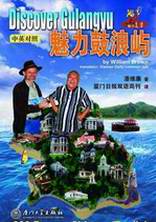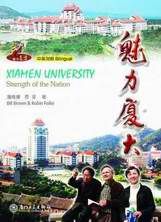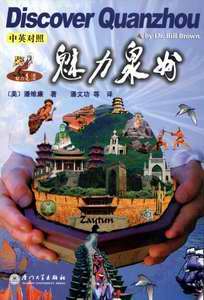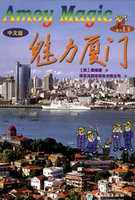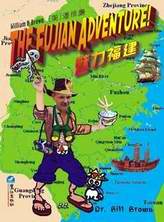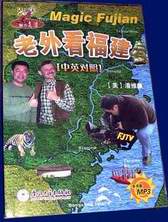![]() Click
to
Access
Click
to
Access
AMOY MAGIC SITE from
OUTSIDE China
![]() Click
to Access Amoy
Magic Site from
Click
to Access Amoy
Magic Site from
INSIDE
China ![]()
TRAVEL
LINKS
![]() Xiamen
Xiamen
![]() Gulangyu
Gulangyu
![]() Jimei
Jimei
![]() Tong'an
Tong'an
![]() Jinmen
Jinmen
![]() Zhangzhou
Zhangzhou
![]() Quanzhou
Quanzhou
![]() Wuyi
Wuyi
![]() #1Fujian
Sites!
#1Fujian
Sites!
![]() Fujian
Foto Album
Fujian
Foto Album
![]() Books
on Fujian
Books
on Fujian
![]() Readers'Letters
Readers'Letters
![]() Ningde
Ningde
![]() Zhouning
Zhouning
![]() Longyan
Longyan
![]() Sanming
Sanming
![]() Putian
Putian
![]() Bridges
Bridges
![]() Travel
Info,
Travel
Info,
![]() Hakka
Roundhouses
Hakka
Roundhouses
![]() Travel
Agents
Travel
Agents
MISC. LINKS
![]() Amoy
People!
Amoy
People! ![]()
![]() Darwin
Driving
Darwin
Driving ![]()
![]() Amoy
Tigers
Amoy
Tigers
![]() Chinese
Inventions
Chinese
Inventions
![]() Tibet
in 80 Days
Tibet
in 80 Days![]()
![]() Amoy
Vampires!
Amoy
Vampires!
![]() Dethroned!
Dethroned!
![]()
![]() Misc.Writings
Misc.Writings
![]() Latest
News
Latest
News
![]() Lord
of Opium
Lord
of Opium
![]() Back
to Main Page
Back
to Main Page
Copyright 2001-7 by Sue Brown & Dr.
Bill ![]() Order
Books
Order
Books
Note:
Please click thumbnails
for larger photos!!
![]() Amoy
Hill's Photos
Amoy
Hill's Photos![]()
![]() AmoyMission-1893
AmoyMission-1893
NARRATIVE OF EXPLORATORY VISIT TO CONSULAR CITIES OF CHINA
(1844, 1845, 1846)
BY
REV. GEORGE SMITH, 1857 Scanned
by Dr. Bill Brown
![]() Chap
25 Departure to Amoy
Chap
25 Departure to Amoy ![]() Chap
26 Daily Occurrences at Amoy
Chap
26 Daily Occurrences at Amoy
![]() Chap
27 New Year Festivities
Chap
27 New Year Festivities ![]() Chap
28 Visit Amoy High Mandarins
Chap
28 Visit Amoy High Mandarins
![]() Chap
29 Prevalance of Opium Smoking
Chap
29 Prevalance of Opium Smoking ![]() Chap
30 Female Infanticide
Chap
30 Female Infanticide
![]() Chap
31 Daily Incidents at Amoy Cont'd
Chap
31 Daily Incidents at Amoy Cont'd ![]() Chap
32 Mandarins Entertain Missionaries
Chap
32 Mandarins Entertain Missionaries
![]() Chap
33 General Description of Amoy
Chap
33 General Description of Amoy ![]() Chap
34 Depart Amoy for Canton; Opium Problem
Chap
34 Depart Amoy for Canton; Opium Problem
CHAPTER XXVII. NEW-YEAR FESTIVITIES.
Customary Observances of the New Year-Moral Tracts by native Scholars-Antithetical
Sentences over the Entrance of Houses-Busy Adjustment of pecuniary Matters-Annual
Custom of ¡°Surrounding the Furnace"-A Family Scene-Superstitious
Mode of prognosticating the Seasons of the coming Year--New-Year Visits
to some Chinese Friends-Ta laou-yay-Lim-pai-Lim seen-sang-Tan seen sang-Universal
Prevalence of Gambling-A missionary Service.
THE approach of the new-year holydays imparted, for the next few days,
an air of excitement to the busy masses in the narrow, crowded streets.
In one of my daily excursions with the missionaries through the city,
we visited the temple of Kwante, the "god of war," in whose
image a piece of glass on the belly was intended to represent the soul
of the deity. Two images of his attendants, with their usual fierce looks,
stood near to affright the superstitious. Near this was also a temple
of Budh¡¯s mother, whose image was furnished with eighteen hands. A neighboring
hall contained eighteen images, which represented the eighteen original
disciples of Budh. In these temples we distributed copies of a tract composed
for the season, being an address to the people ¡°on crossing the new year."
We afterward entered the citadel, or city proper, which is included within
the walls, and contains only a small portion of the population. After
a few minutes we reached the opposite gate to that by which we had entered,
and soon again passed into the outer city on our return. A number of ornamented
boxes, or cabinets, about two feet in width, were to be seen, at every
two hundred yards, projecting from the corner of some house, and having
their exterior inscribed with various sentences, one of which intimated
to the reader that "every fragrant action would have its remembrance."
These, on inquiry, proved to be little chests, voluntarily provided by
the more superstitious of the shopkeepers, to become the depository of
pieces of paper inscribed with writing, in order that no one might violate
the sanctity of the Chinese written character by tossing away these precious
fragments to be trodden under foot. At the new-moon festival these scraps
of paper are consumed according to custom, to prevent any imaginary desecration.
In all directions, also, were to be seen a number of moral tracts, which,
at this period of the year, were conspicuously displayed on the walls
in places of public resort, and contained the well-intended exhortations
to virtue, addressed by some native scholar to his less instructed countrymen.
One of these was the production of a sew-tsai graduate of Chang-chew,
who, after sundry magniloquent remarks of a prefatory kind, exhorted his
readers to regain their primitive rectitude and virtue. About the middle
of the sheet a succession of diagrams or figures represented the heart
of man in the several stages of its downward career to vice. The heart
was first white, without blemish or spot, and a quotation was subjoined
from the ancient classics, to show that "man's disposition was originally
good." The next figure represented the heart, with a small patch
of black, to denote incipient deterioration, the effect of neglected education.
The third, fourth, and fifth figures, with the gradually increasing amount
of black, denoted the gradual but certain progress of moral depravity;
till the sixth, with its l1ldely-shapen heart, entirely filled up with
black, showed the consummation of wickedness, and the complete ascendency
of evil principles. The remaining six figures, with the brief moral sentences
appended below, proceeded to illustrate the gradual restoration of the
human heart, from the lowest depths of depravity to the pure, unsullied
white of original virtue, by obedience to the maxims of the sages and
the practice of good. Another part of the sheet described the same progress
to evil and restoration to virtue, by means of hearts placed in different
degrees of obliquity. Copies of this moral tract had been liberally circulated
at Chang-chew by the original composer. The wooden block from which it
had been printed was sent to Amoy, where anyone, who had sufficient benevolence
or interest in the public morals, was permitted to strike off a number
of impressions for distribution. The name and seal of the individual who
had the public spirit to incur the expense of the paper, ink, and printing
of this new edition, were duly blazoned forth in red color on the lower
part of the sheet, as the reward of his good deeds.
[Antithetical Couplets]
Another custom, universally prevalent at this season, and characteristic
of the nation, deserves special notice. The entrance to every Chinese
dwelling had visibly depicted on the door and door-posts, as well as on
the cross-beam above, two or more pair of antithetical sentences, chosen
with great care from their approved writings, and generally combining
a number of lucky expressions, as well as a neatly-contrived antithesis
of ideas and cognate tones. The selection of these sentences requires
an amount of classical knowledge and critical acumen such as is only possessed
by literary persons. All the teachers of the missionaries petitioned for
a short vacation, to enable them to turn to their own pecuniary gain their
respective talents in selecting and writing these antithetical sentences.
The poor scholars might be seen in all directions standing at a table
in some street, or at the entrance of some temple, and selling their writings
for a few copper cash, the new year being the annual period for removing
the old sentences and substituting new ones in their place. The paper
on which they were written was of various colors, the general color, however,
being of a deep red. White paper denoted that the inmates had lost a parent
during the past year. The second year's mourning required blue for a father,
yellow for a mother, and carnation-color for grandparents. A light-red
indicated the third year of mourning; after which they reverted to the
usual color of a dark-red.
Numerous proclamations, also, from the municipal authorities, appeared
at this time on the walls adjoining the gates of the citadel, on various
subjects of public exhortation. One of these public notices contained
a warning from the district-magistrates, prohibiting constables and other
subordinate officials from apprehending individuals on the sanction of
old warrants, and thus seeking to take a bribe for their liberation.
Jan. 26tn.-This being the last day of the Chinese year,
busy preparations were in progress for terminating business, for laying
in a stock of provisions, and for celebrating the superstitious observances
of the evening. In all directions companies of cooly-bearers might be
seen carrying large packages of new-year presents to the friends of their
master. In the various houses which we visited after sunset, the head
of the establishment, attended by his sons or his partners, was to be
observed balancing his mercantile accounts, and settling the debts of
the year. So punctilious are the Chinese in the observance of this commendable
practice, that they say they could not enjoy the festive occasion, nor
sleep during the night, unless they had previously relieved their mind
of this burden. The swan-pwan, or counting-board [abacus] was in constant
use; and when the business seemed well-nigh terminated, and the books
were about to be closed, a neighbor would hurry into the shop, and pecuniary
transactions would again for a season be renewed. While these important
matters were in progress, the family were engaged in burning gilt paper,
with the occasional discharge of fireworks, and in making preparations
for the peculiar annual custom named hwui-loo, or "surrounding the
furnace." This is performed by the members of each family sitting
down to a substantial supper, with a pan of charcoal placed under the
table in the center of the party. The only explanation which they gave
me of this odd custom was, that fire is the most potent of the elements,
and hence, probably, they derived a notion of its efficacy in averting
evil, or in strengthening the bonds of family union. The women observed
this custom in an inner room by themselves; while the master of the house,
with his sons and his hired assistants, sat down in an outer room. In
one of the families, in which we were invited to remain in order to view
the detailed observances of the occasion, the proprietor, a man apparently
of some little wealth, sat down with his assistants, his younger son,
and two little grandsons. The eldest son, a youth of about nineteen, sat
near us, attending to our wants, but without partaking of the feast himself.
Every minute he was on his legs, attending to the beckoning motions of
his father, on whom he waited without the least appearance of its being
esteemed unusual. At one time he brought a spoon, or a pair of chopsticks;
at another time he fetched a paper napkin for his father's use, or refilled
his glass with samshoo. The old gentleman, after a short time became silent
and drowsy. But the rest of the party meanwhile increased in mirth, as
they rapidly consumed the good fare placed before them. The conversation
became increasingly animated, and some of the women soon entered at the
farther end, and joined in the subjects of amusement. These were the secondary
wives of the household, the proper wife and the daughters-in-law being
never permitted to mingle in the free, unrestrained conversation with
strangers which is sometimes allowed in the inferior class of female domestics.
Great civility was shown to us; but we declined to partake of the feast.
It was very melancholy to witness the habit of reckless lying which manifested
itself so frequently in their replies, both the old man and the son showing
not the least compunction or sense of shame in telling flagrant falsehoods
whenever it suited their purpose. In reply to our question about one of
the women present, the old man said, first, that she was an acquaintance:
then, shortly after, that she was a daughter-in-law; and, at last, the
plain truth came out, that she was one of his secondary wives. Not the
slightest jealousy appeared to be cherished in regard to the latter class
of wives, though the mistress of the family did not once make her appearance.
This lower class of women are generally purchased from poor parents as
domestic servants, with the liberty of degrading them to the rank of inferior
wives, which practice is generally prevalent, and is considered, even
by their sages, to be strictly in accordance with moral rectitude, if
the proper wife has given birth to no son. The offspring of both classes
of wives are considered legitimate, although the sons of concubines, in
inheriting the patrimony, receive only half as much as the son of the
proper wife, or mistress of the household.
The supper being ended, they next prepared for burning the small wooden
frames of the lamps, which are generally kept burning in the dark interior
of their houses. From the ashes which remain they profess to derive means
of ascertaining the exact period of the rainy and dry seasons of the coming
year, the knowledge of which is very important in a land where famine
often exposes so many thousands to the danger of starvation, from the
destruction of their crops. Three little frames of lamps were brought,
and placed ready for lighting on the pavement. The eldest son went forth
into the street, and discharged some crackers, to drive away the evil
spirits, while some of the domestics folded up about a bushel of gold
and silver paper into the shape of lumps of silver. The eldest son soon
returned and set fire to the materials, and in about ten minutes the whole
was consumed to ashes. The live embers were then carefully distributed
into twelve little heaps, answering to the twelve months of the year.
They were then anxiously watched, the heap which first burned out showing
the most rainy month, and that which last burned out indicating the month
in which there would be most sunshine and least rain. Particular attention
was directed to the third, fourth, fifth, sixth and seventh months, as
the rain, if excessive in those months, would cause mildew and blight
of the harvest. Acclamations of joy arose, as the second heap first died
out, and predicted the greatest quantity of rain in the month when it
would be most seasonable and least injurious. The fifth month was to be
clear weather, and without rain. The sixth and seventh heaps, as the partially-consumed
embers were left half red-hot and half black, denoted that there would
be partly fine and partly rainy weather in the corresponding months. The
result of the experiment seemed to give the assembled party great satisfaction,
which was only slightly interrupted by our asking whether the next neighbor's
heaps of consumed embers would coincide with the favorable prediction.
To this they replied by begging us to mark the result in the course of
the year; and also by saying that they had nothing to do with their neighbor's
house. The samshoo now passed around, and we left them to prolong their
festivities for an hour or two, when they retired to rest, till the booming
of the midnight watch-gun roused them from their slumbers, and they hastily
rose to offer each other their new-year's congratulations, and to renew
their feasting.
The next morning the city authorities commemorated the new year, by assembling
in a body, at dawn of day, and going forth in procession to an imperial
temple in the suburb outside the north gate. There they' made nine ko-tow,
or knockings of the head on the ground before a large yellow screen, which,
for the occasion, occupied the place of imperial royalty. This custom
is renewed also on the emperor's birthday, and denotes the most decided
act of submission. It was this ceremony which the imperial officers tried
in vain to extort from former British embassadors, as a token of vassalage.
Wishing to obtain a closer view of Chinese domestic life, during this
period of universal holyday, I availed myself of the opportunity of accompanying
one of the American missionaries on a series of calls at the houses of
his more constant hearers. After visiting a few families in the immediate
vicinity of our own residence, we directed our steps to the house of the
old merchant, commonly addressed by the honorable title of Ta laou-yay.
His house, of better exterior and larger size than the generality, enjoyed
also the rare distinction of two lofty poles of honor, commonly called
joss-poles, and usually placed in front of houses of mandarins and temples
of the first order. These were badges of honor ceded to the old man on
account of the successful literary career of his son, now absent at Peking.
The room into which we were conducted was hung round with pictorial representations
of landscapes and fairy scenes, and delicate specimens of calligraphy.
Among the latter were two tablets, one of which was covered with the character
for ¡°longevity," written in a hundred different modes; and the other
with the character for "happiness," written also in several
different modes. Both scrolls had a highly ornamented paper as a groundwork,
and were sent as presents from Peking by his son. On the table were lying
the cards of the city mandarins, sent out of compliment to his rank, and
containing the usual good wishes of the season. Close to these was the
new-year's state almanac, just received from the capital. On another part
of the table lay a number of Christian tracts, and the Ten Commandments,
with a commentary, which he said that he daily studied. He took me into
an anteroom to view his son's library, consisting of about 2000 thin volumes,
and occupying a book-shelf of moderate size. Returning into the larger
room, he pointed me to a table at the upper end, occupying the place usually
assigned to the family idols and the ancestral tablet, and bade me observe
that there were no idols. Two candle-stands and a few incense-sticks still
remained on this altar-table, with a cushion placed before it, on which
he said that he knelt to pray, and burn incense to the one true God. I
reminded him that God was present every where, and willing to receive
worship in every place; and that the state of the heart was more important
than posture of body or burning of incense. A beverage, made from lotus-seed
and a kind of dried fruit, with sweet-meats, was now served round; during
which time he made inquiries respecting my visits to the other cities
on the coast of China, and the cause of my contemplated return to England.
He exhorted me to trust in Providence for the restoration of my health.
He passed some high-flown compliments on ourselves, and made some general
remarks on the favorable opinion of the mandarins concerning the missionaries,
during which he professed to repeat some recently uttered flattery of
the officials respecting our integrity and benevolence. A son and a grandson
stood at the entrance of the room, but did not utter a word except when
the conversation was specially directed to them; whereupon they returned
a modest reply, and again resumed their silent, quiet manner. He permitted
us at length to take our departure.
Our next visit was to the house of an old man named Lim-pai, who had been
recently reclaimed from opium-smoking. The comparative poverty of his
present circumstances-the consequence of the late British war-had produced
in him a fretfulness and irritability, which he had great difficulty in
controlling. He was formerly a land-owner in Koo-lang-soo, and was also
the proprietor of some trading junks. The arrival of the British force
involved him in ruin, and he had to effect his escape across to Amoy,
where, though much reduced in circumstances, he had at this time sufficient
means of subsistence-his sons having become boatmen, and contributing
to the support of their parent. According to the common custom every where
prevalent in China, the whole family, down to the third generation, lived
together in one house. Formerly he betrayed great excitement at the remembrance
of his misfortunes, bemoaning his fate and the hardship of his lot. Latterly
he appeared to have been softened by the exhortations of the missionaries
to submit to the will of God; my companion especially, on this occasion,
adverting to his own recent domestic affliction in the loss of his wife
and two children, and instancing his own comfort and trust in the mercy
and love of a chastening Father. The old man's spirits were gradually
cheered, and he talked about various matters of local interest. Seeing
on the table, at the end of the room, the usual assemblage of those emblems
of superstition-the family idols on the right hand, and the ancestral
tablet in its corresponding case on the left-I drew his attention to the
inconsistency of this fact with his regular attendance at the chapel.
I remarked also to him, that Ta laou-yay had put away his idols, and that
I could have wished he had done the same. This excited the old man to
say some uncharitable things of Ta Iaou-yay; in the course of which he
called him an old hypocrite, and asserted that, if we could gain admission
into the interim of the house, he doubted not that we should find the
idols in some other room. A long conversation here took place, in which
a servant who accompanied us earnestly took part, on the difficulties
and obstacles in the way of removing the family idols. The old man said
that he never worshiped idols, and disbelieved in such nonsense; but grandmothers,
mothers, and wives were so superstitious-the members of the family, who
had to be consulted and won over, were so numerous-and the domestic disturbance
consequent on any rash step of this kind outraging their feelings would
be so serious a matter-that he preferred peace and quietness, and was
compelled to let the idols remain merely for custom's sake, although he
himself never would be so foolish as to worship them.
We next visited Lim seen-sang, a man of some little property, who was
engaged as teacher of one of the missionaries. His uncle held office in
some distant part of the country, and had purchased for his nephew the
literary degree of sew-tsai; but by subsequent perseverance in his studies,
Lim had also secured, by his own personal merit, further advancement to
some intermediate literary honors beyond the first degree, as about a
dozen certificates on the wall intimated. His grandmother having died
during the past year, etiquette required that he should remain at home,
and make no visits of ceremony at the new year. The new antithetical sentences,
affixed to the door-posts and above the entrance, were characteristic
of the general thirst for distinction:-" May I be so learned as to
secrete in my mind three myriads of volumes!" "May I know the
affairs of the world for six thousand years!"
We afterward walked within the citadel, and soon arrived in a close, narrow
lane, in which was situated the house of another of the teachers, Tan
seen-sang, whom we found at home awaiting our visit. He had, much to our
regret, incurred the expense of a little feast, to do honor to the occasion,
of which we were compelled to partake. Several neighbors, chiefly women,
were congregated in the court, and our host appeared rather proud of our
visit.
We were introduced separately to all the denizens of the little street,
who came to present their congratulations. The wife came out after a little
time, and having modestly paid her respects at a distance, soon retired
into an inner room. The old mother was, however, more officious, and brought
out her two young grandchildren, smartly attired. She seemed to be the
presiding authority in the family; and it was pleasing to observe the
extreme deference universally paid to this elderly class of females. All
the inmates of each family appeared to be united in the closest bonds,
and to bring together their earnings to a common fund, from which they
defrayed the expenses of supplying their daily wants. The old lady of
the household acted in the useful capacity of nurse, housekeeper, and
adviser, and exercised over the members of the family a general control,
which was never resisted. Her word was law, and her influence appeared
to be paramount. The teacher was a poor man, earning only six dollars
a month from tuition. He seemed, however, contented; and the old
lady especially thanked my companion for his kindness to her son. When
a grandmother dies, the wife then comes into her full share of influence;
and the position which she holds in the family circle presents the social
condition of females in China, as an anomalous spectacle of mingled degradation
and independence.
A triumphal arch, under which we passed on our return, was erected by
command of one of the emperors, and was inscribed with an imperial edict,
instituting a certain reward or bestowal of rank on the families of widows
who remained unmarried. Only the richest families are said to benefit
by this act of imperial favor.
On our way we experienced some difficulty in threading our course through
the crowds attracted by the feats of jugglers and mountebanks, or assembled
in more orderly rows on benches to hear a public novel-reader explaining,
in the vulgar dialect, from a written book in his hand. Fireworks were
to be heard bursting and dispersing their smoking contents in all directions.
The whole population seemed to divide their employments between feasting,
firing, and gambling on this universal holyday, celebrated by one third
part of the human race. For the next half month gambling, however, appeared
to be the principal business. The laws being in abeyance, and their penalties
ostensibly relaxed for five days against this vice, whole streets might
be seen covered with gaming tables, which were kept, in some cases, by
mere children, a small percentage on the stakes, or a payment according
to time, being received as hire. Noisy quarrels, comparatively unusual
at other times, were now to be heard in all directions. Even the temples
were not exempt from the prevailing passion of the season. Long rows of
gambling-stands, within the sacred precincts and close to the idols, were
occupied by noisy disputants, angrily shaking their fists or exercising
their voices as the falling dice disappointed their eager hope of gain.
Very different was the scene which I was privileged to witness on the
afternoon of this day. I attended the service at the American missionary
chapel, at which seventy persons were present, when the teacher, Tan seen-sang,
read Milnes's tract on the new year, and expatiated on it with much energy,
after previous preparation and instruction by a missionary at his own
house. He sometimes hazarded comments of his own, which were of a rather
equivocal tendency. Eyeing with great earnestness a native doctor and
a Budhist priest, who bad been attracted thither by curiosity, he related
to them the doctrines taught by the missionaries, and the effect produced
by them on his own mind. He said that ten of his friends had banded together
with himself, for the purpose of attending to these doctrines, and of
worshiping God. He said that they had persevered in this course for some
time, and that God had blessed them during the whole period. As an instance
and proof of the latter, he mentioned that one of their number, a very
old man in the city, though previously childless, had now two children
by his wife, both sons. The missionary, in his turn, addressed the people,
previously to inviting them to join with him in a prayer to the Almighty.
At the close of his address a well-attired man entered into conversation
with him, expressing his satisfaction with the doctrines which he had
just heard, but saying that his mind was confused by the perplexing variety
of religions, viz., the Budhist, the Taouist, and the Roman Catholic religions.
He especially inquired whether we practiced fasting; in reply to which
he was informed that our mode of fasting consisted not in mere abstinence
from particular food, but in abstinence with a view to prayer, humiliation,
and meditation, the moral state of the heart being the matter of essential
importance. He was encouraged to renew his visits, and reminded of the
unreasonableness of expecting to obtain an intimate knowledge of all the
doctrines of the Gospel in a single hearing.
The initials
L. M. S. = London Missionary Society.
A. B. C. F. M. = American Board for Conduction Foreign Missions
A. B. B. F. M. = American Baptist Board for Conducting Foreign Missions.
Am. Ep. Ch. = American Episcopal Church
A. G. A. B. = American General Assembly¡¯s Board
C. M. S. = Church (of England) Missionary Society
E. B. M. S. = English Baptist Missionary Society.
A Narrative of an Exploratory Visit to each of the Consular Cities of
China, and to the Islands of Hong Kong and Chusan, in Behalf of the Church
Missionary Society, in the years 1844, 1845, 1846, by the Rev. George
Smith, M.A., of Magdalen Hall, Oxford, and Late Missionary in China
New York, Harper and Brothers Publishers, 52 Cliff Street, 1847
Scanned by Dr.
Bill Brown Xiamen University MBA Center
Please
Help the "The Amoy Mission Project!"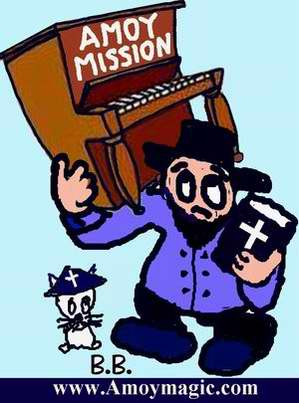 Please
share any relevant biographical material and photos for the website and
upcoming book. All text and photos will remain your property, and
photos will be imprinted to prevent unauthorized use.
Please
share any relevant biographical material and photos for the website and
upcoming book. All text and photos will remain your property, and
photos will be imprinted to prevent unauthorized use.
E-mail: amoybill@gmail.com
Snail Mail: Dr. William Brown
Box 1288 Xiamen University, Xiamen, Fujian PRC 361005
![]() Favorite
Fujian Sites
Favorite
Fujian Sites ![]() Fujian
Foto Album
Fujian
Foto Album ![]() Xiamen
Xiamen
![]() Gulangyu
Gulangyu
![]() Fujian
Guides
Fujian
Guides ![]() Quanzhou
Quanzhou
![]() Zhangzhou
Zhangzhou
![]() Longyan
Longyan
![]() Wuyi
Mtn
Wuyi
Mtn ![]() Ningde
Ningde
![]() Putian
Putian
![]() Sanming
Sanming
![]() Zhouning
Zhouning
![]() Taimu
Mtn.
Taimu
Mtn. ![]() Roundhouses
Roundhouses
![]() Bridges
Bridges
![]() Jiangxi
Jiangxi
![]() Guilin
Guilin
![]() Order
Books
Order
Books![]() Readers'
Letters New: Amoy
Vampires! Google
Search
Readers'
Letters New: Amoy
Vampires! Google
Search
Last Updated: October 2007
AMOY
MISSION LINKS
![]()
![]() A.M.
Main Menu
A.M.
Main Menu
![]() RCA
Miss'ry List
RCA
Miss'ry List
![]() AmoyMission-1877
AmoyMission-1877
![]() AmoyMission-1893
AmoyMission-1893
![]() Abeel,
David
Abeel,
David
![]() Beltman
Beltman
![]() Boot
Family
Boot
Family
![]() Broekema,
Ruth
Broekema,
Ruth
![]() Bruce,
Elizabeth
Bruce,
Elizabeth
![]() Burns,
Wm.
Burns,
Wm.
![]() Caldwells
Caldwells
![]() DePree
DePree
![]() Develder,
Wally
Develder,
Wally
![]() Wally's
Memoirs!
Wally's
Memoirs!
![]() Douglas,
Carstairs
Douglas,
Carstairs
![]() Doty,
Elihu
Doty,
Elihu
![]() Duryea,
Wm. Rankin
Duryea,
Wm. Rankin
![]() Esther,Joe
& Marion
Esther,Joe
& Marion
![]() Green,
Katherine
Green,
Katherine
![]() Gutzlaff,
Karl
Gutzlaff,
Karl
![]() Hills,Jack
& Joann
Hills,Jack
& Joann
. ![]() Hill's
Photos.80+
Hill's
Photos.80+
..![]() Keith
H.
Keith
H.![]() Homeschool
Homeschool
![]() Hofstras
Hofstras
![]() Holkeboer,
Tena
Holkeboer,
Tena
![]() Holleman,
M.D.
Holleman,
M.D.
![]() Hope
Hospital
Hope
Hospital
![]() Johnston
Bio
Johnston
Bio
![]() Joralmans
Joralmans
![]() Karsen,
W&R
Karsen,
W&R
![]() Koeppes,
Edwin&Eliz.
Koeppes,
Edwin&Eliz.
![]() Kip,
Leonard W.
Kip,
Leonard W.
![]() Meer
Wm. Vander
Meer
Wm. Vander
![]() Morrison,
Margaret
Morrison,
Margaret
![]() Muilenbergs
Muilenbergs
![]() Neinhuis,
Jean
Neinhuis,
Jean
![]() Oltman,
M.D.
Oltman,
M.D.
![]() Ostrum,
Alvin
Ostrum,
Alvin
![]() Otte,M.D.
Otte,M.D.![]() Last
Days
Last
Days
![]() Platz,
Jessie
Platz,
Jessie
![]() Pohlman,
W. J.
Pohlman,
W. J.
![]() Poppen,
H.& D.
Poppen,
H.& D.
![]() Rapalje,
Daniel
Rapalje,
Daniel
![]() Renskers
Renskers
![]() Talmage,
J.V.N.
Talmage,
J.V.N.
![]() Talman,
Dr.
Talman,
Dr.
![]() Veenschotens
Veenschotens
. ![]() Henry
V.
Henry
V.![]() Stella
V.
Stella
V.
. ![]() Girard
V.
Girard
V.
![]() Veldman,
J.
Veldman,
J.
![]() Voskuil,
H & M
Voskuil,
H & M
![]() Walvoord
Walvoord
![]() Warnshuis,
A.L.
Warnshuis,
A.L.
![]() Zwemer,
Nellie
Zwemer,
Nellie
![]() Fuh-chau
Cemetery
Fuh-chau
Cemetery
![]() City
of Springs
City
of Springs
(Quanzhou, 1902!!)
![]() XM
Churches
XM
Churches ![]()
![]() Church
History
Church
History ![]()
![]() Opium
Wars
Opium
Wars
![]() A.M.
Bibliography
A.M.
Bibliography
![]() YMCA
Volunteer!
YMCA
Volunteer!
![]() XICF
Fellowship
XICF
Fellowship![]()
![]() Temples
Temples![]()
![]() Mosques
Mosques
![]() Christ
in Chinese
Christ
in Chinese
Artists'
Eyes
DAILY LINKS
![]() FAQs
Questions?
FAQs
Questions?
![]() Real
Estate
Real
Estate
![]() Shopping
Shopping
![]() Maps
Maps
![]() Bookstores
Bookstores
![]() Trains
Trains
![]() Busses
Busses
![]() Car
Rental
Car
Rental
![]() Hotels
Hotels
![]() News
(CT)
News
(CT)
![]() Medical
& Dental
Medical
& Dental
![]() Expat
Groups
Expat
Groups
![]() Maids
Maids
![]() Phone
#s
Phone
#s
EDUCATION
![]() Xiamen
University
Xiamen
University
![]() XIS(Int'l
School)
XIS(Int'l
School)
![]() Study
Mandarin
Study
Mandarin
![]() CSP(China
Studies)
CSP(China
Studies)
![]() Library
Library
![]() Museums
Museums
![]() History
History
DINING ![]() Tea
Houses
Tea
Houses
![]() Restaurants
Restaurants
![]() Asian
Asian
![]() Veggie
Veggie
![]() Junk
Food
Junk
Food
![]() Chinese
Chinese
![]() Italian
Italian
![]() International
International![]()
![]() Visas
4 aliens
Visas
4 aliens
RECREATION
![]() Massage!
Massage!
![]() Beaches
Beaches
![]() Fly
Kites
Fly
Kites
![]() Sports
Sports
![]() Boardwalk
Boardwalk
![]() Parks
Parks
![]() Pets
Pets
![]() Birdwatching
Birdwatching
![]() Kung
Fu
Kung
Fu ![]() Hiking
Hiking
![]() Music
Events
Music
Events
![]() Cinema
Cinema
![]() Festival&Culture
Festival&Culture
![]() Humor&
Humor&![]() Fun
Fotos
Fun
Fotos![]()
BUSINESS
![]() Doing
Business
Doing
Business
![]() Jobs!(teach/work)
Jobs!(teach/work)
![]() Hire
Workers
Hire
Workers
![]() Foreign
Companies
Foreign
Companies
![]() CIFIT
(Trade Fair)
CIFIT
(Trade Fair)
![]() MTS(Translation)
MTS(Translation)
![]()
Back to Top
